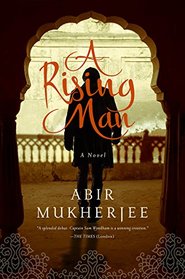When I first picked up A Rising Man and began to read, I read it as I would any other historical mystery. I soon fell headfirst into a major roadblock: the slow-as-treacle pace. Fortunately, before I gave up and moved to another book, I realized that the setting of this book is absolutely fabulous and well worth the price of admission.
Mukherjee has written this book in such a way that readers get to see Calcutta in 1919 from several different points of view. It is a city-- and a country-- just beginning its quest for freedom in earnest. The vast majority of Indians do not wish to be a part of the British Raj. There are revolutionaries showing us why India wants its freedom. There are British bureaucrats who-- above all else-- wish to maintain their precarious status quo. There are Indians like Sergeant Banerjee who want the British out but want to learn how to govern and how to fight crime first. And into this mix comes Sam Wyndham, who's survived a long meat-grinder of a war with few illusions left. He's fought side by side with brave and honorable men of all races and creeds, so he doesn't always see situations from his superiors' points of view. And speaking of points of view, there are several that some readers may find uncomfortable.
Once I settled down to read this book as historical fiction rather than as a mystery, I was much happier. Yes, the mystery is a good one, and Sam Wyndham is a finely drawn character, but it is the city of Calcutta that steals the show. I'm looking forward to Abir Mukherjee's next book with a great deal of interest.
Mukherjee has written this book in such a way that readers get to see Calcutta in 1919 from several different points of view. It is a city-- and a country-- just beginning its quest for freedom in earnest. The vast majority of Indians do not wish to be a part of the British Raj. There are revolutionaries showing us why India wants its freedom. There are British bureaucrats who-- above all else-- wish to maintain their precarious status quo. There are Indians like Sergeant Banerjee who want the British out but want to learn how to govern and how to fight crime first. And into this mix comes Sam Wyndham, who's survived a long meat-grinder of a war with few illusions left. He's fought side by side with brave and honorable men of all races and creeds, so he doesn't always see situations from his superiors' points of view. And speaking of points of view, there are several that some readers may find uncomfortable.
Once I settled down to read this book as historical fiction rather than as a mystery, I was much happier. Yes, the mystery is a good one, and Sam Wyndham is a finely drawn character, but it is the city of Calcutta that steals the show. I'm looking forward to Abir Mukherjee's next book with a great deal of interest.
Captain Sam Wyndham no longer works for Scotland Yard. His former commander in what is now known as World War I has offered him a position with the police in Calcutta.
First-time author Abir Mukherjee takes us to a land halfway around the world, at a time 100 years ago. Colonial powers still control a majority of the countries of the world, while local citizens have limited to no power. Some locals dislike that system enough to want to do something to change it â by talk, or by force. Case in point â a senior consulate official has been found murdered, with a note warning about the status of England's colony stuffed into his mouth.
Mr. Mukherjee shows a talent for painting a scene with his words, so that the reader will feel like they are IN the environment rather than simply reading about it. The same is true for his characters â we are not dealing with people who are entirely saintly nor unredeemably wicked. The âgood guysâ have their faults, while the antagonists show some redeeming social qualities.
I've caught onto this series late enough that the second book in the series has already been released, as has a standalone novel by the author; I plan to acquire and read them sooner rather than later.
First-time author Abir Mukherjee takes us to a land halfway around the world, at a time 100 years ago. Colonial powers still control a majority of the countries of the world, while local citizens have limited to no power. Some locals dislike that system enough to want to do something to change it â by talk, or by force. Case in point â a senior consulate official has been found murdered, with a note warning about the status of England's colony stuffed into his mouth.
Mr. Mukherjee shows a talent for painting a scene with his words, so that the reader will feel like they are IN the environment rather than simply reading about it. The same is true for his characters â we are not dealing with people who are entirely saintly nor unredeemably wicked. The âgood guysâ have their faults, while the antagonists show some redeeming social qualities.
I've caught onto this series late enough that the second book in the series has already been released, as has a standalone novel by the author; I plan to acquire and read them sooner rather than later.




